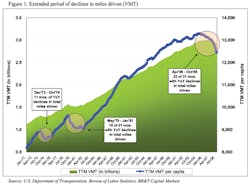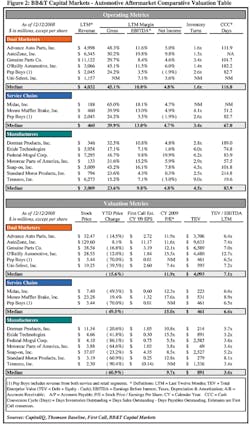Warranty Wars: Do long powertrain warranties force consumers to wait until their factory warranty expires to to make vehicle modifications?
Automobile warranties get a lot of credit and a lot of blame, depending on which side of the fence you sit. If you are an automobile manufacturer or distributor, or even a manufacturer or seller of replacement auto parts, then warranties can be a good marketing tool. If you are a consumer with stars in your eyes, then warranties, at least theoretically, provide a cost-savings benefit.I don't have high expectations of auto manufacturers and distributors—I fully expect them to try and "weasel" out of covering problems. The so-called warranty doesn't mean much to me. I don't believe in them and I don't trust them.
The question in the specialty-parts business is: are long powertrain warranties from auto manufacturers and distributors causing your customers who want to modify their engines, transmissions, and differentials to put off the modification until the powertrain warranty expires? A determined customer won't be willing to wait; those customers will install the products they want as soon as they can afford them. A customer who says, "Damn the warranty, install the turbocharger kit," is the customer we like.
Savvy consumers understand how warranties really work. They know that if they modify the engine with a turbocharger kit, the manufacturer will understandably void any warranty claims for engine problems. However, if the customer modifies the engine and the driver's side power window fails, the savvy consumer feels the manufacturer should stand behind the warranty for that repair (it is not related to engine performance) if it is within the time and mileage limit. The engine modification did not put extra strain on the power window motor.
SOME QUICK HISTORY
Using long powertrain warranties to sell automobiles is nothing new. I can recall learning that Chrysler used this tool back in the 1960s to spur sales. They offered the then-unheard-of five-year powertrain warranty. At the time, Chrysler was selling British-made Rootes Motors vehicles in the U.S., including the Sunbeam Tiger, which featured a 260-cubic-inch Ford V-8 engine. If you purchased a Ford Falcon or other Ford vehicle fitted with this engine, Ford provided a three-year warranty; however, if you purchased a Sunbeam from Chrysler, they would warranty the Ford engine for five years. Strange brew.
In 1999, Hyundai Motor America had a problem. Their latest generation of vehicles was much improved, but sales had slumped to their lowest level since the company entered the U.S. market in 1986—they had sold fewer than 100,000 units the previous year. To get things moving, the company needed to "prove" to consumers that Hyundai cars were in fact much improved and far better than their reputation.After months of due diligence, Hyundai came out with a 10-year/100,000-mile limited powertrain warranty that was transferable—to a point. The powertrain warranty could be transferred from one immediate family member to another family member. Thanks in part to the long powertrain warranty (and improved vehicle quality), Hyundai sales have increased substantially and they continue to grow each year.
Based on the success of the long powertrain warranty, Hyundai family member KIA followed suit (both have since dropped the powertrain warranty's "transferability").
Isuzu also offers a 10-year/120,000-mile limited powertrain warranty. Then, last year, the warranty wars heated up when General Motors announced a 5-year/100,000-mile warranty on its vehicles.
THE LATEST VOLLEY
The most recent auto manufacturer to use a long powertrain warranty as a marketing tool is Chrysler. Newly separated from Daimler Benz, Chrysler announced in late July that Chrysler products from July 26, 2007 and on would be covered by a "lifetime" limited powertrain warranty. I put quotes around the word "lifetime" because there is some small print and exclusions.
First of all, the limited lifetime warranty is not transferable. Think about it. How many vehicle owners keep their car for a lifetime? It's more like six or seven years. A modern powertrain in a modern vehicle should easily last for 100,000 miles or more—providing the vehicle owner follows the maintenance requirements. Despite what the new-car or new-truck dealer may try to infer, the owner is not required to have the "authorized dealer" perform regular maintenance. An independent shop will do or owners can do it themselves—they just have to keep records indicating service was performed.
REPLACEMENT PARTS WITH "LIFETIME" WARRANTIES
Automotive replacements parts generally have a warranty—usually 90 days to one year, a reasonable amount of time. However, the marketing types went crazy with warranties several years ago by placing long and even "lifetime" warranties on parts, such as brakes, clutches, shock absorbers, and more—parts that, when properly designed, will do their job and wear out in the process.
Knowing that brake pads were designed to wear out, many brake manufacturers and remanufacturers still elected to put a "lifetime" warranty on their products. They knew full well the brake pads would wear down to the squealers within the usual mileage. What they wanted was to bring the customer back into the store for the brake replacement service. These manufacturers were willing to supply replacement, no-cost brake pads on a regular basis, as long as the customer paid for the labor and any additional parts necessary, such as rotors, hoses, springs, anti-rattle clips, and more. Consumers seem to have gotten wise to this tactic, and in recent years, the "lifetime" warranty on parts designed to wear out to work properly does not seem to be as effective as it once was.
HIGH-PERFORMANCE SPECIALTY PARTS
This is where things can get sticky. Right now, both Chevrolet and Scion offer engine modifications that, if installed by an authorized dealer, can keep the powertrain warranty in force. I don't know of anyone who has taken advantage of this protection, but it is unusual.
In this issue's "Warranties" feature, Managing Editor Chad Simon outlines what SEMA and auto manufacturers, such as Scion (Toyota) and Chevrolet (General Motors), are doing to "reassure" buyers they will be covered if they choose to add aftermarket specialty parts to their vehicles.
For now, my advice is to let the customer know that, in general, engine modifications will usually void the factory powertrain warranty. There is a reasonable expectation that other problems unrelated to the powertrain should still be covered. Have your customers read their vehicle owner's manual. They may discover they need to switch to a "severe" maintenance schedule to keep their new vehicle warranty in place. Unlike conventional wisdom implies, short-trip, stop-and-go driving is severe service, not easy driving.
Mike Anson




